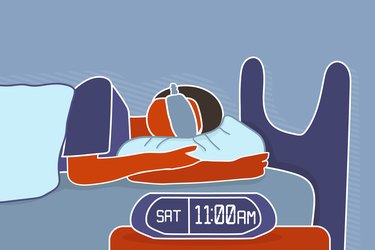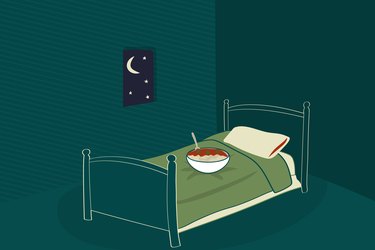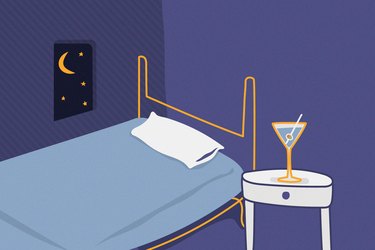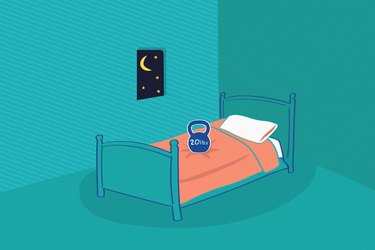
For the majority of us, weekends are a time to let loose. When you don't have to show up for work or school the next day, there's no reason not to stay up late going out with friends or binge-watching a Netflix series until the wee hours. After all, you can let yourself sleep in as long as you like the next day.
Researchers dub this pattern "social jet lag," which is the discrepancy between people's sleep schedules on weekdays versus weekends and how it affects your circadian clock, similar to travel-induced jet lag.
Video of the Day
But it turns out that, even if having a fluid schedule means you log more total zzzs by lingering between the sheets until noon, it's actually not great for your health.
Related Reading
How Your Sleep Schedule Affects Your Circadian Rhythm
When you think about what a good night's rest means, you probably focus on two factors: quantity and quality. Research has proven that getting plenty of deep, uninterrupted shut-eye supports cognitive function, mood regulation, weight loss, immunity, heart health and much more.
But a third aspect of sleep is newly emerging as a significant determinant of health: consistency.
"One of the core facets of sleep hygiene is regularity — going to bed and waking up at the same time every day," says sleep specialist Rajkumar Dasgupta, MD, spokesperson for the American Association of Sleep Medicine and assistant professor of clinical medicine at the University of Southern California.
Why Does Consistency Matter So Much?
After all, as long as you're getting enough sleep, who cares if you're out from 10-6 one day and 12-8 the next?
Well, a roller coaster sleep schedule can lead to poor shut-eye. To understand why, let's step back for a sec and explore the two ways that sleep is regulated: homeostatic drive (also called sleep pressure) and circadian rhythm.
"The homeostatic drive means that the longer you stay awake during the day, the more you will want to sleep at night," Dr. Raj says. From the moment you open your eyes, the pressure for sleep begins to build up in your body, growing stronger and stronger until you are tired enough to zonk out at nighttime.
Unfortunately, turning off your alarm on the weekend can screw up your homeostatic drive.
"If someone sleeps in on Saturday morning, goes to bed late on Saturday night and sleeps in again on Sunday morning, it will be hard to fall asleep early on Sunday evening," says neurologist Anita Shelgikar, MD, director of the Sleep Medicine Fellowship at University of Michigan Medicine.
In part, that's because you haven't built up enough homeostatic drive.
"Going to bed late on Sunday and having to wake up early for school or work on Monday morning can lead to starting the week sleep-deprived," Dr. Shelgikar says, "which has implications for driving safety, academic and work performance, mood and interpersonal relationships."
How Your Circadian Rhythm Works
The second key sleep regulator is circadian rhythm, which is an internal biological clock that determines when we feel tired versus alert. Circadian rhythm is heavily influenced by exposure to light. In response to bright light, your body churns out hormones like cortisol that make you energized and awake. As darkness falls, your circadian clock triggers the release of the sleep-inducing hormone melatonin.
But a topsy-turvey sleep schedule can throw these hormones out of whack. For example, if you turn in late, then melatonin is still coursing through your body when it's time to get up in the morning and you'll feel groggy. Meanwhile, cortisol will be surging in the evening, when it's time to wind down. Your circadian rhythm doesn't change on a dime, so it can take a few days to adjust to shifts in your bedtime and wake time.
A small June 2017 study in Scientific Reports found that Harvard students with erratic sleeping patterns had a lower GPA than their peers who stuck to a schedule — despite getting the same amount of overall sleep.
"They hit the snooze button more and had difficulty both initiating sleep at night and waking up in the morning," Dr. Dasgupta says.
The researchers discovered that helter-skelter sleep shifted students' body clocks 2.6 hours later than peers with a consistent routine. Because their melatonin kicked in significantly later, they felt foggy-headed during a 9 a.m. class or exam. And poor grades aren't the only thing that can go wrong.
4 Ways an Erratic Sleep Schedule Might Harm Your Health
We're all for variety in meals, workouts and date-night ideas — but stay the course when it comes to sleep. Switching up the timing of trips to dreamland can have serious consequences.
1. It Ups Your Risk for Heart Disease
In a March 2020 study from the Journal of the American College of Cardiology, adults with the most irregular sleep patterns had twice the risk of heart disease, including heart attack and stroke, compared to those who had the most regular sleep patterns.
Meanwhile, a September 2018 article in Scientific Reports found that sleep irregularity in older adults ups the risk for cardiac consequences, including high blood pressure, diabetes and weight gain (more on those two later) — even though the participants were logging an adequate amount of shut-eye.
"Interestingly, although sleep irregularity didn't impact sleep duration, these are the same consequences we see when someone has insomnia or is sleep-deprived," Dr. Dasgupta says.
A June 2017 study in Sleep fleshed this out further: Each hour of social jet lag was associated with an 11 percent increase in the risk of heart disease and a 28 percent uptick in the likelihood of being in fair or poor health compared to excellent health.
Social jet lag is calculated as the difference in midpoint between weekday and weekend sleep.
2. It's Linked to Diabetes
An August 2019 study in Diabetes Care revealed that each hour of social jet lag is associated with a 27 percent increased risk of metabolic syndrome, which includes type 2 diabetes, increased blood sugar, high blood pressure, excess belly fat, high triglyceride levels and low levels of "good" HDL cholesterol.
3. It's Associated With Obesity
A February 2019 study in PLOS One confirmed a link between chronic disruptions to your sleep schedule and having overweight or obesity, in part because social jet lag leads to later mealtimes. Folks whose sleep times were all over the map also consumed more calories, meat and sweets than those with clockwork bedtimes and wake times.
4. There's a Connection to Depression
According to the September 2018 Scientific Reports study, irregular sleep patterns are associated with stress and depression, while the Sleep study found that those with social jet lag were likelier to be in a bad mood.
One Caveat: Certain People Aren’t Affected by Irregular Sleep
Some of us might be able to mix up when we turn in and get up without deleterious affect.
"Sleep is individualized, so some of us are more susceptible to social jet lag than others," says Dr. Dasgupta. "All of us know someone who goes to bed whenever and wakes up whenever and is super successful — two gold Olympic medals, a Pulitzer prize, an Academy award. For those folks, I'm not worried about their schedule being a little off sometimes."
There's no way to know for sure how much erratic sleep will impact you, but Dr. Dasgupta suggests that a good gauge might be how you respond to travel-related jet lag and daylight saving time. If that one-hour difference throws you off every March and November, then chances are you're also more sensitive to other shifts in your sleep patterns.
6 Ways to Make Up for a Late Night (Without Sleeping In)
Occasionally, we all go to sleep later than usual — whether you were wrapping up a pressing work project, working on your fantasy football league or tossing and turning in bed due to stress.
But even if you're sleep-deprived, experts say you still shouldn't catch extra zzzs the morning after.
"If we add too much variability to our sleep-wake schedules, we can actually make it harder to fall asleep and wake up at our desired times," Dr. Shelgikar says.
Here's what to do instead:
1. Open Your Shades as Soon as You Wake Up
"Light is the most powerful indicator that signals the brain to stay awake," Dr. Shelgikar says. "Increasing your exposure to bright light as soon as you wake can help with maintaining a consistent sleep-wake schedule."
Get plenty of sunshine during the day and go for a morning walk— even if it's just to the mailbox.
2. Get Some Exercise (Yes, Even if You’re Dragging)
This will balance your homeostatic drive by tiring you out, so you'll be ready to hop between the sheets at night.
Just make sure you're not working out within a few hours of bedtime, as this might affect your ability to fall asleep.
3. Avoid Napping, Which Lowers Your Homeostatic Drive
If you absolutely must take a midday snooze — for example, if you are too sleepy to safely get behind the wheel — limit it to a 20-minute power nap.
"You will stay in the lighter stages of sleep, so it can help you feel refreshed and sharp without interfering too much with your nighttime sleep," Dr. Dasgupta says. "Time your power nap with your circadian rhythm by resting right after lunch, which is when most people have a melatonin release and naturally feel drowsy."
Just try not to nap after 3 p.m., as even a short snooze after this time is more likely to interfere with your sleep drive and make it harder to fall asleep come bedtime.
4. Forgo Caffeine in the Afternoon
A pick-me-up later in the day has been shown to suppress melatonin release, according to an October 2018 study in Sleep.
Skip alcohol, too, because it interferes with sleep.
Related Reading
5. Pull the Shades in the Evening
Limit your exposure to bright light one to two hours before bedtime, Dr. Shelgikar suggests.
Dim the lights and avoid using screens an hour before bedtime; an October 2018 study in Chronobiology International suggests that blue light inhibits melatonin.
"Minimize use of personal electronic devices one to two hours before bedtime," Dr. Shelgikar says. An August 2018 review in Sleep Science and Practice determined that technology use before bed increases stress, making it difficult to relax into sleep.
6. Try a Weighted Blanket
Weighted blankets are the buzzed-about new sleep-inducing tool, and although research is limited, an April 2020 study in the American Journal of Occupational Therapy implies that they might be beneficial in reducing stress and lulling insomniacs to sleep.
Wrap a heavy, cuddly blanket around your shoulders for the half hour or so before you turn out the lights, and then drape it over your comforter when you crawl into bed.
Tip
It's easy to let your sleep schedule slide, so in the future, set an alarm half an hour before you hit the hay to remind you that it's time to wind down. “Our circadian rhythm is 24.2 hours, instead of 24,” Dr. Dasgupta says. “As a result, most of us are innately wired to be night owls.”
3 Times When You Should Sleep In
Experts agree that if you're sick, injured or have been engaged in a physically strenuous activity — say, running a marathon or moving — your body needs extra sleep in order to heal.
"Getting good sleep helps boost your immune system so you can recover faster," Dr. Dasgupta says. Just be careful not to snooze so much that it messes up your sleep schedule.
So, How Bad Is It Really to Sleep Late on the Weekends?
It depends.
"If your quality of life is poor — say, if you're getting bad grades or performing poorly at work — then I would be concerned," Dr. Dasgupta says. "But if you are happy and functioning fine and are only worried about your sleep schedule because you read this article, then I think it's OK. After all, we're human!"
That said, no matter how well you're doing, there is never a downside to having a normal sleep routine. "The more we can maintain a consistent sleep-wake schedule, seven days per week, the better it is for our sleep health," Dr. Shelgikar says.
- Sleep Medicine: "The acute effects of the COVID-19 pandemic on insomnia and psychological symptoms"
- Sleep: "1067 SOCIODEMOGRAPHICS, POOR OVERALL HEALTH, CARDIOVASCULAR DISEASE, DEPRESSION, FATIGUE, AND DAYTIME SLEEPINESS ASSOCIATED WITH SOCIAL JETLAG INDEPENDENT OF SLEEP DURATION AND INSOMNIA"
- Journal of Biological Rhythms: "The Association between Social Jetlag, the Metabolic Syndrome, and Type 2 Diabetes Mellitus in the General Population: The New Hoorn Study"
- PLOS One: "Association between social jetlag food consumption and meal times in patients with obesity-related chronic diseases"
- Scientific Reports: "Validation of the Sleep Regularity Index in Older Adults and Associations with Cardiometabolic Risk"
- Scientific Reports: "Irregular sleep/wake patterns are associated with poorer academic performance and delayed circadian and sleep/wake timing"
- Sleep: "Lifetime coffee consumption, pineal gland volume, and sleep quality in late life"
- Chronobiology International: "Systematic review of light exposure impact on human circadian rhythm"
- Sleep Science and Practice: "Sleep problems in excessive technology use among adolescent: a systemic review and meta-analysis"
- American Journal of Occupational Therapy: "Weighted Blanket Use: A Systematic Review"
- Diabetes Care: "Cross-sectional and Prospective Associations of Actigraphy-Assessed Sleep Regularity With Metabolic Abnormalities: The Multi-Ethnic Study of Atherosclerosis"
- Journal of the American College of Cardiology: "Sleep Irregularity and Risk of Cardiovascular Events: The Multi-Ethnic Study of Atherosclerosis"
Is this an emergency? If you are experiencing serious medical symptoms, please see the National Library of Medicine’s list of signs you need emergency medical attention or call 911.



